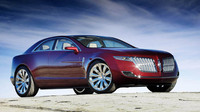Ford in the Alternative Energy Future
 The Lincoln MKR concept, introduced recently at the North American International Auto Show in Detroit, has new engine technology that delivers V-8 power and performance with V-6 fuel economy. |
Dearborn MI February 4, 2007; Ford engineers are working on alternative-fuel powertrain systems, including hybrid, clean diesel, hydrogen combustion and fuel cell to accommodate the variety of resources and requirements around the world that will dictate which technologies are likely to catch on, says Nancy Gioia, Ford Motor Company director of Sustainable Mobility Technology Lab and Hybrid Vehicle Programs.
"The reason we don't think there is a single solution is that while there are common challenges around the world, the economic, political and social realities differ from region to region," Gioia told the Automotive World Leadership Congress. "Each region will move toward a solution based not only on the major policy issues of the time, but on the established infrastructure, political climate and unique economies as well as consumer income levels, driving habits, vehicle requirements and preferences."
In Brazil, for example, where sugar crops are abundant, biofuels work well. Biofuels eventually may become more prevalent in North America, where ethanol is slowly gaining traction. But in Europe, where farmland is scarcer, biofuels may prove less desirable, whereas diesel technology has gained a strong toehold.
"Since all of the future fuels under consideration have benefits and drawbacks, it is very possible all of these fuels will be employed for different drivers in different regions in the world," Gioia said.
Europe's need for fuel efficiency became critical earlier than North America's, helping to spur the development of diesel-burning vehicles. Emissions standards for carbon dioxide (CO2) are more stringent in Europe, but carbon dioxide emissions are not regulated in the United States by the Environmental Protection Agency (EPA).
As emissions control technology converges with possible EPA regulations on carbon dioxide, diesels may become popular in the North American passenger car market. The prevalence of diesel vehicles in Europe may help automakers get them into the hands of North American customers sooner.
Flex-fuel vehicles (FFVs), which can run on either gasoline or E85 (a mixture of 85 percent ethanol and 15 percent gasoline), are making inroads in Europe, but again with a regional twist. Ethanol in North America is derived primarily from corn, but 150 Ford FFVs in the United Kingdom are powered by bioethanol made from wheat and sugar beets.
Does it all lead to hydrogen?
Biofuels and diesels are often viewed as intermediate steps to a hydrogen-fueled future, according to Gioia.
"Hydrogen burns very cleanly compared to fossil fuels, therefore tailpipe emissions are greatly reduced and often eliminated entirely," Gioia said. "Furthermore if -- and I emphasize if -- we are able to derive hydrogen from renewable resources, we also eliminate CO2 emissions that contribute to global climate change."
Before hydrogen powered-vehicles become a practical alternative, a number of problems need to be solved, such as developing a re-fueling infrastructure. Even then, the technology might not be appropriate for all regions of the world.
The primary problem with hydrogen is the lack of an infrastructure – the means to manufacture and distribute hydrogen to consumers. The United States and other developed countries might eventually finance an infrastructure development, but creating such a system might prove cost-prohibitive in weaker economies.
According to Gioia, Ford sees the hydrogen internal combustion engine as a bridge technology to fuel cells.
"With some relatively minor modifications, a conventional internal combustion engine can be upgraded to run on hydrogen instead of gasoline," Gioia said. "Since automakers already know a lot about internal combustion engines and have methods in place to mass produce them, the cost to build these systems, although still quite expensive, is far less cost prohibitive than technologies like fuel cells."
Where the technology and social issues lead automakers and consumers in the future is in question. While there may be no silver bullet when it comes to alternative fuels, Ford is making sure it has enough bullets in its arsenal to make sure consumers get the vehicles they deserve, no matter where they live.
"What is certain is that it will require an unprecedented level of cooperation and partnership among the auto industry, the energy providers, government, academia and the public to solve these challenges," Gioia said. "One part cannot work against any other part if we are to succeed."


